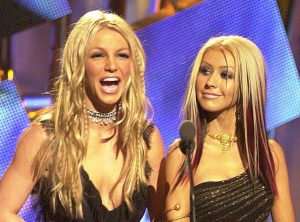It’s been six years, but the new album that Christina Aguilera has been promising for years has finally arrived. Liberation is the title, but the question is whether or not Aguilera, one of the strongest vocalists of her generation, has finally found the right path for her outstanding ability. Through all the hits and misses, “Xtina” has always made herself unique by never playing it safe.
Six years isn’t unheard of between albums—P!nk and Kesha both returned after five years with strong new albums last year, for example—but at a time when pop music requires near constant output from its stars, such a lengthy break may not come heavily recommended. Artists like Rihanna, Selena Gomez and Ariana Grande have ushered in a new era of pop where singers are never truly off the grid musically: even if they’re “taking their time” with their own new music, they are attaching themselves to other people’s singles in the form of features, tracks that are usually catchy and club-friendly that will perform well on charts and thereby keeping their name and their brand relevant while they work on getting that new album out. But even Christina Aguilera’s peers, arguably Beyoncé, Britney Spears or even Lady Gaga, have never taken such a long break between albums with little other musical activity. As if that wasn’t enough pressure, Aguilera has had to deal with an extra dose given that her last two albums, Bionic (2010) and Lotus (2012), were critical and commercial stink bombs, falling flat and leaving her without a clearly defined musical identity in this current era of pop music. But we must recall—Aguilera has always struggled to define her musical identity as well as with the ever-shifting demands of mainstream pop.

- Aguilera and Britney Spears at the VMAs in 2000
One thing that’s inarguable is that Aguilera has coasted through the last wave of mainstream pop music, needing to attach herself to something that would keep her relevant despite her underperforming albums. Her first attempt was Burlesque, a musical film co-starring Cher that received mixed reviews from critics and was somewhat of a disappointment at the box office, but the one that would stick was her gig as a coach on NBC’s The Voice, where she found her place in contemporary pop music and culture. It was also the gig that would make Aguilera seem “likeable” again—as she had come to gain a reputation as less than that in years past. Anyone who followed pop music in the late ‘90s and early ‘00s recall the endlessly unfair comparisons between Xtina and Britney Spears—but one thing that is quickly forgotten is how ambivalent Aguilera was to her pop stardom in those days, never keeping up with Spears’ quick output. Despite achieving all-around success with her self-titled debut album in ’99, which generated hits such as “Genie in a Bottle,” “What A Girl Wants” and “Come On Over Baby (All I Want Is You),” Aguilera was weary of the album and her place in pop music, stating that wasn’t who she wanted to be as an artist. At the time, she told the press that she was “so over” the album and wanted to explore other creative paths, citing women like Etta James as inspirations. Right from the beginning, Aguilera had trouble bridging the gap between her desire to stay true to who she wanted to be as an artist and who the pop music landscape demanded she be. She never adhered to established pop music cycles, and always seemed conflicted about her musical identity. As early as 2000, critics pounced: the Pittsburgh Post-Gazette (her hometown paper) pointed out that “what a girl wants — and desperately, it seems — is to leave her Mouseketeering teenybopper image far behind and position herself as a womanly R&B diva when, in fact, she's better suited to the sticky kids' stuff.”

- Aguilera, Britney Spears and Madonna perform the opening act at the 2003 MTV Video Music Awards
While Britney was busy finding new uses for her baby voice with chart-topping singles, provocative music videos and sold-out world tours, Aguilera worked hard on developing her own style in what would become her finest moment and peak in pop culture and music, Stripped (2002): her second mainstream album (and fourth overall). The Stripped era was most probably Aguilera’s most significant moment of pop cultural relevance: she took creative control and left behind whatever teen pop image she had, exploring adult themes like self-respect and female sexuality. It led to a spot next to Britney as they kissed Madonna at the 2003 MTV Video Music Awards, in what was perceived as a major moment of pop baton-passing. But Xtina seemed immediately unimpressed with being slotted into a place alongside Britney and Madonna in mainstream stadium pop and spoke openly about her frustrations with the award show kiss in a way that the public perceived as “unlikeable.” In an infamous interview after the VMAs, Aguilera blasted artists like Britney, Madonna and even Beyoncé, saying Britney and Madonna were not artists, “they're just performers — fake and superficial, like the entire event,” and said people like Britney and Beyoncé were “desperate to come across as sweet, good little girls, but then you see them in photo shoots that are extremely sexual — tight little booty shorts, and not much else. So why do they try to be virginal in interviews?” Refusing to play by conventional pop star rules is only a girl’s friend until she starts bashing other stars—and the word “unlikeable” sealed Xtina’s fate for several years thereafter.
Aguilera returned with another album four years later in 2006—a long break even then when her so-called peers had new albums every other season—Back to Basics, which called upon her true musical inspirations like Etta James, Billie Holiday, Ella Fitzgerald and Otis Redding. While its lead single “Ain’t No Other Man” performed well on the charts, the album’s retro vibe pulled Aguilera out of the contemporary pop music conversation and landscape and simultaneously failed to establish her in the adult contemporary pop conversation (which has since embraced pop singers like P!nk), since she was caught between the world of Britney-era teen pop and the desperation to establish herself as something unique in the world of grown-up pop music. By this point, it seemed like Christina Aguilera was too talented for her own good—unimpressed with the game the other pop stars were playing, but still struggling to define herself outside of it. Another four years passed before her next album would surface, 2010’s Bionic, and by then, Xtina was both ahead and tragically behind the times—experimenting with electropop futurism at a time when electropop was just starting to dominate music charts. No longer in the shadow of Britney, Aguilera was now being compared to Lady Gaga, and it was clear who was winning that conversation (spoiler alert: not Xtina). Other artists had since come to occupy the space that Aguilera occupied in the 2000s, and she was now struggling to keep up. She found her footing again on The Voice in 2011, featuring on Maroon 5’s hit single “Moves Like Jagger” and then recording what would be her next album just two years after her last, 2012’s Lotus, which is arguably Aguilera’s most commercially focused album. She collaborated with Max Martin for the first time (who has worked with the biggest names in contemporary pop music), and was finally trying her hand at the pop music game she had for so long refused to play. Reviews were mixed, the sound generic, and the numbers even worse—Lotus flopped even harder than Bionic.
Since then, Aguilera took time off to spend with her family and began teasing her next album as early as 2014. In 2015, her manager Irving Azoff reignited the callous Britney vs. Xtina debate when he described what Aguilera had been working on in a podcast interview, saying: “Christina’s not peaked yet. She’s in the prime of her career, will tour the world. We’re not ready to sit down in Vegas [implying a diss towards Britney, who found success with a Las Vegas residency show from 2013 to 2017]. She’s about to finish her record … and the record’s amazing.” In 2016, Aguilera said of her new album (which she had initially promised would be out by the end of that year): “It is a body of work that is timeless.” Thereafter, fans began anticipating a comeback album and era with a Stripped-level of musical reinvention, and after nearly four years of talk and six years since her last studio release, Xtina confirmed in May with the release of a new single called “Accelerate” that her eighth studio album, Liberation, would follow in June.

- Xtina for Billboard in 2018
Considering the creative and commercial failures that were Bionic and Lotus, it only made sense that Xtina would do what Xtina does best with her next studio effort—take her time, even if it means sacrificing the spot she once held in the pop music conversation. On Liberation, Aguilera returns to her R&B-influenced roots, conjuring a vibe that is simultaneously reminiscent of the R&B that Rihanna has popularized in recent years while also bringing to mind, on a lesser scale, the hip hop sound that catapulted Fergie to mainstream success as a solo artist. As far as lead singles go, “Accelerate” is weak—which led many to question whether or not the album would truly be her comeback. And whether or not Liberation is a comeback album is truly the question to consider while listening: if we compare it to her previous studio efforts, it definitely stands out as something worthwhile and authentic, rather than experimental or commercially focused. But if we compare it to her peak level of relevance and success that she found nearly sixteen years ago on Stripped, we meet a woman who sounds like she has come into her own, regardless of what the terribly restrictive and constraining confines of the pop music landscape have projected onto her. In one sense, Aguilera came into her own years ago on both Stripped and Back to Basics, but in terms of finding her footing as an artist in an ever-shifting and youth-obsessed industry, Xtina truly does seem liberated once again on an album named Liberation. The sixth track “Fall In Line” is undoubtedly a highlight—not just because of her outstanding collaboration with Demi Lovato (the two strongest vocalists of their respective generations collaborated on one track; how did the universe not implode?) but because of the lyrics that make the listener recall fondly the issues she explored on Stripped in songs like “Fighter” and “Beautiful,” reminding young girls that the bullshit women face in society might just be “the way it is,” but girls and women can always fight back because not everyone is made to fall in line. The R&B focus of the album works, since mainstream sounds aren’t her strong suit (we saw how that worked out on Lotus). “Accelerate” is a weak lead single, but on another level, it is the only song on the album that could probably fill the shoes of a lead single, given its club-friendly hip hop vibe. “Sick of Sittin’” succeeds as a somewhat protest song, but what really stands out on Liberation are the ballad tracks—“Deserve,” “Maria,” “Twice” and “Masochist” are songs that really bring the listener back to the originally liberated Xtina on Stripped, which means all the fan predictions were true: Aguilera took her time yet again and returned to her roots on her latest album, and is the closet she has ever been to zeroing in on the right path for her immense talent.
One of the weaker elements of Liberation, however, is its tendency to over-rely on its features from other artists—despite Xtina’s standout moments, there are a few too many guest appearances—and I would have preferred if Aguilera had remained solo on a few of the songs where she has others accompanying her. I only say this since Xtina sounds stronger than she has in years, and I wanted to hear more of HER killing it, even if some of the features work with the rest of the album. The Aguilera on Liberation reminds listeners of the kind of artist she told us she wanted to be all those years ago—even if the road to maintaining success became messy thereafter, Xtina’s vocal and pop cultural impact speaks for itself: she has been cited as an inspiration by further generations of Disney-bred stars, such as Lovato and Selena Gomez, both of whom cited Aguilera and Stripped as inspirations for their last two studio albums. After all, we must remember: Christina Aguilera has never fallen in line—not with the rules of pop music, or being average when it comes to her voice—and on Liberation, she reminds us of who she is and always has been, just beneath the surface and with the range to prove it.
Jeffrey’s favorite tracks from Liberation: “Fall In Line,” “Deserve,” “Twice,” “Masochist,” “Unless It’s With You,” and “Maria”


No comments:
Post a Comment